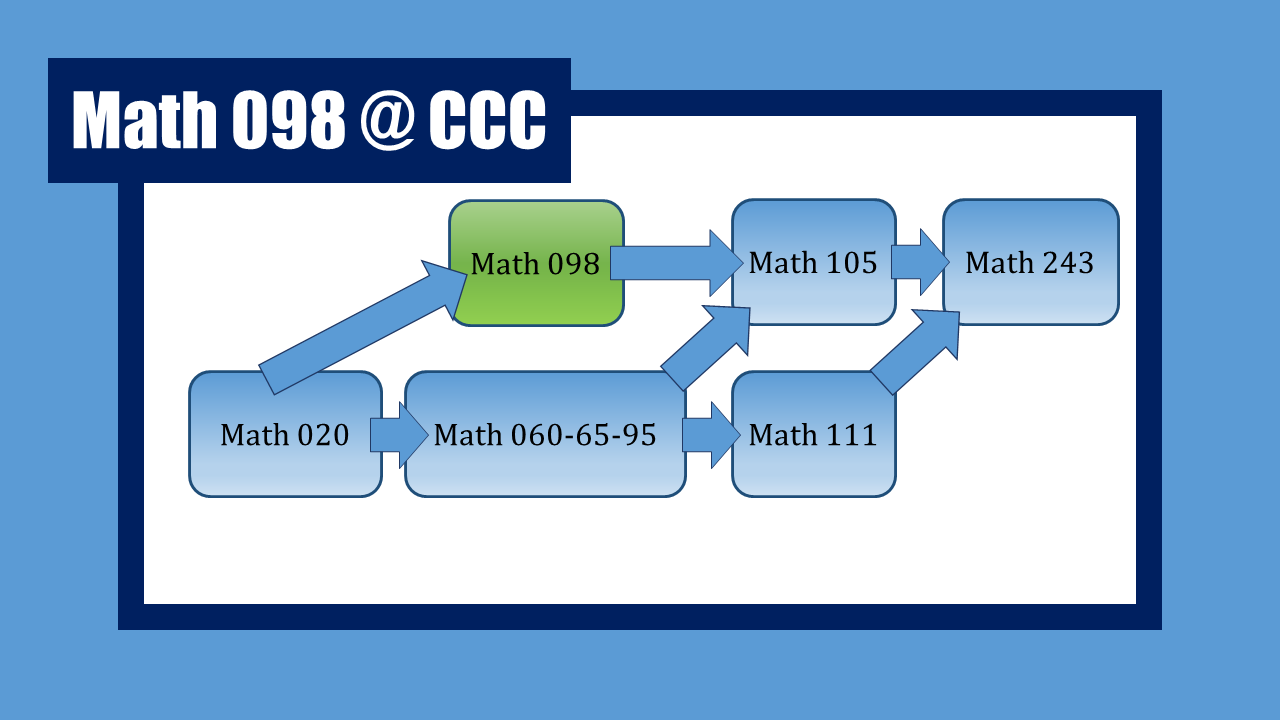Course Background, Development, and Presentation Information

In the Spring of 2016, we applied for a grant through OER Oregon to create and disseminate teaching/learning materials for Math 098 to/for community colleges in Oregon.
We piloted these materials in Fall 2016 at Clackamas Community College, in all our sections of Math 098. We are now in our 3rd term (Spring 2017), and continue to teach with them, improving and refining as we go.
At Clackamas, 098 sits between Math 020 and Math 105:

Our goal was to create materials that
- are learner-centered
- are focused on group work and collaboration
- use current, real-world contexts that have meaning for students and instructors alike
- recognize that critical thinking doesn't just happen; we seek to create opportunities for students to make critical thinking a habit of mind
- acknowledge that many students in the "alternate pathway" bring a good bit of anxiety and fear to a class like this, and that these feelings must be addressed before students can open up to learning - we see Growth Mindset* education as a means by which to accomplish this.
*Please note that Growth Mindset education materials are not published under Creative Commons licensing. The link above is for educational purposes; to learn about Growth Mindset education. We have no intention of using these materials in our finished product for the MTH 098 course.

Math outcomes
- Identify and interpret numerical, statistical, and measurable information.
- Critically assess quantitative information in order to independently apply appropriate problem-solving techniques.
- Utilize proportional reasoning (such as scaling, probabilistic thinking, percents, identifying populations and sample, identifying groups and subgroups, interpreting venn diagrams, rates, dimensional analysis, etc.)
- Utilize numeric and graphical techniques to solve problems using multiple tools (such as by hand, with calculators, with spreadsheets).
Academic/student behaviors and habits
- Demonstrate a growth Mindset.
- Reflect regularly and meaningfully on mistakes, mathematical concepts, and academic behaviors.
- Organize course materials and work products appropriately and independently.
- Demonstrate confidence and curiosity in engaging with mathematical content.
Critical Thinking skills
- Use evidence in the formulation of a solution to a problem.
- Organize ideas in the process of problem solving and communicate this organization (and its justification) clearly
- Reflect on the assumptions that are critical to a solution to a problem
- Recognize the fallibility opinions, the probability of bias in human behavior, and the potential of altering evidence according to personal preferences
- Implement the following scaffolding structure in problem solving
- Reflect and ask
- Plan and predict
- Act and observe
- Report and reflect

Google Docs were predominantly used in creating the presentation materials for ORMATYC 2016. Each is a link to the Google Doc - you are welcome to make a copy of these to your own Google Drive and edit them under the particular Creative Commons licensing (CC SA BY) of our materials. Some images were created in Microsoft Office - if you would like an editable electronic source for any images, please let us know.
This is the publicly accessible content from a course on MyOpenMath. There may be additional content available by logging in